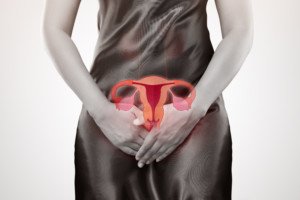
Got questions about ovarian cancer you can’t find online the answers for?
Ovarian cancer is known as the “stealth killer,” because it silently stalks its victims without even giving the courtesy of an early symptom warning.
Today’s medical technology fails to effectively screen for this most deadly of all gynecological cancers.
Classic symptoms of ovarian cancer are: bloating, feeling full after small meals, gas, indigestion, low back pain, sometimes even leg pain, and weight loss but a growing stomach.
For this article I interviewed Dr. David A. Fishman, MD, a gynecological oncology surgeon with Weill Cornell Medicine in NYC.
Questions Answered about Ovarian Cancer Symptoms
When a woman begins developing symptoms of OC, is it possible she can be experiencing only one symptom for quite a while, or will multiple symptoms begin appearing at the same time?
Dr. Fishman: That’s a great question. Unfortunately, every woman will experience a different set of symptoms, and the question that arises is, “Are there symptoms that are unique to early stage cancer, versus early symptoms of advanced stage cancer?”
As we know, not all women have the same symptoms when they ovulate – it’s the same for ovarian cancer.
The problem we have is in determining if there are unique symptoms associated with only advanced stage ovarian cancer, or if there is a subset of symptoms associated with early stage cancer.
Is it possible to rank the symptoms of OC, in order of most common to least common?
It is possible to rank symptoms, but the symptoms are so varied, and the consistent symptoms that all would agree on are seen with advanced stage disease.
The majority of the symptoms that are consistent with cancer are due to tumor masses causing pressure, and associated signs and symptoms such as fluid in the abdomen, abdominal bloating, and weight loss.
My suggestion is that any woman experiencing abdominal discomfort for more than 5-7 days should have a thorough medical evaluation. In the course of the evaluation, the question should be asked: “Are my ovaries ok?”

Shutterstock/Emily frost
Many people will be seen by their family practitioner, gynecologist and internist, and each physician brings a different skill-set and focus on patient care.
If the cause of the discomfort is not found, I don’t think it’s inappropriate for a patient to ask, “Are my ovaries ok?”
Different doctors have a different focus. The best care a person can receive is by being a knowledgeable health care consumer and also being aware of their own body and what feels right and doesn’t feel right.
If their doctor can’t determine the problem, they certainly will be able to refer to the appropriate health care provider.
Would the symptoms necessarily be near-constant, continuous? Or can they be intermittent? Can they come and go, with days of normalcy in between?
The symptoms can be extremely variable and do not have to be persistent. It can be such a stealth disease – both to the patient and the healthcare provider.
It comes, it goes, it can be persistent, it can be intermittent, and it is almost always highly variable.
By the time a woman has symptoms, she usually has an advanced stage of the disease.
In the National Cancer Early Detection Program, we have found women who had no symptoms of cancer and had advanced disease.
I’m not saying that the symptoms don’t exist, but they can be extremely variable. Awareness is critical. If you don’t feel right, your ovaries must be formally evaluated.

Shutterstock/Olena Yakobchuk
We have evaluated over 8,000 women in our high-risk program with normal ultrasounds and normal examinations.
They were having prophylactic surgery (surgery done to prevent disease) because of their genetic predisposition placing them at a higher risk than the general population, which is a highly selective group.
Yet we found four women who had microscopic cancers in stage 1. These women had no symptoms, and two had cancer of the ovaries and two had fallopian tube cancer.
In our program, over 99% of women were normal, even in the very high risk group. We did multiple surveys to discuss various symptoms.
Surveys can be highly problematic, as there is a tremendous recall bias.
We found that most women with normal sized ovaries with early stage disease had no symptoms. Not even all women with advanced stage had symptoms.
But symptoms didn’t always correlate with the volume of disease. Some women can have horrific disease and feel fine, while others can have several small 1 cm nodules and be very symptomatic. The variability in symptoms is quite large.
The take-home message is if you don’t feel right, go seek appropriate medical care and ask your physician to include an evaluation of the ovaries, fallopian tubes and uterus.
Lower back ache is an OC symptom. Is there data out on what kind of pain this feels like (short of asking an ovarian cancer survivor)? There are different kinds of back “pain.”
Does it resemble menstrual lower back ache? Or more so the pain from a strained lower back from improperly lifting something? Or some other kind of pain?
If you have a mass pressing in your pelvis on the nerves, backache can be a vague symptom of the mass.
The ovaries in a pre-menopausal woman are about 2 inches in size – they are almond-shaped.
Also, inside the abdomen and pelvis are 23 feet of small bowel lying right on top of the ovaries, 9 feet of colon lying adjacent to the ovaries, and a uterus that is the size of a fist.
In the abdomen and pelvis, your ovaries are the smallest organ in size. Just by virtue of what’s in that area, ovaries are the hardest to detect.
That’s also why it is so common to misinterpret ovarian cancer symptoms for GI problems.
The pelvis is a bowl and the ovaries are very small. You can see why it can be such a diagnostic dilemma.
There is no specific type of back pain that I can tell you to look out for – the pain can be the result of poor posture, kidney stone or infection. It’s nondescript.
What percentage of OC patients experience vaginal bleeding?
Very few. Vaginal bleeding is not a symptom that is consistent with ovarian cancer. It is consistent with cancer of the cervix or uterus.
What kind of symptoms would a woman specifically have, that early OC would give off? I know that there have been a few studies focusing on “early” symptoms.
Yes, there are certainly symptoms – abdominal discomfort, frequent urination, change in bladder and bowel habits, losing weight while the abdomen is getting bigger, not being able to eat that much, fatigue, leg swelling – these are all signs of advanced stage disease.
The real question is, “Are there symptoms that are unique to early stage cancer?” We would make a tremendous difference in outcome if we could identify women with early stage disease.
Are there symptoms associated with helping us detect early stage disease before it spreads throughout the abdomen? The answer to that is, “I don’t know.”
The symptoms can be so varied and so subtle that the key is really being aware of your body, and if you don’t feel right and it persists for more than 5-7 days, go seek formal medical evaluation and make sure that includes a formal gynecological evaluation of the ovary.
That may be performed by a pelvic recto/vaginal examination or diagnostic imaging using a pelvic ultrasound, CT scan, MRI, whichever imaging study the healthcare provider feels would be the best evaluation for the symptoms.
The symptom of weight loss is a never quite clarified. Is the weight loss the result of the suppressed appetite? Or can it happen even if the woman continues to eat as she always has?
This is caused by the cancer itself; as it becomes more numerous, the tumor cells produce factors that suppress appetite, such as cachexia (weight loss in someone not trying to lose weight) factors. Factors from the tumors themselves suppress a person’s appetite.
Also, weight loss occurs, but the belly gets bigger. This is a symptom of advanced cancer.
Does the appetite suppression come on overnight, boom, like that? Or is it insidious?
None of these will “boom” overnight. Cancer is a living entity, and the symptoms are often a reflection of the volume of cancer growing in a person, none of which occur overnight.
Just as the cancer doesn’t become a detectable mass overnight, it can easily take several months to over a year before it is appreciated.
None should be an acute change. Some women come in and they’ve often had symptoms for a year, but they may perceive it as having happened over the course of 24 hours.
This disease is an act of God, not a disease that one can create. It’s not like smoking where you increase your risk…it’s a horrible disease that at present is not preventable, short of surgical removal of the ovaries as in prophylactic surgery. Unfortunately, as of today, it’s purely luck when you find it early.
Does the “bloating” sensation symptom ever occur in the upper abdomen? Or is it necessarily always in the lower abdomen?
No; the abdomen and pelvis are one giant cavity. The symptoms in the lower abdomen affect the upper abdomen. Imagine your belly having 7 liters of fluid – when you stand up it goes down and when you lay down, it goes up.
This is the symptom of fluid in the abdomen. There are many different symptoms while you are standing up and lying down.
Is there anything about OC symptoms that makes them uniquely different than symptom groups of other conditions whose symptom groups can mimic OC, such as irritable bowel syndrome?
If a woman has irritable bowel syndrome or diverticulitis, that makes it even harder to attribute her symptoms to ovarian cancer.
It could be a flare from GI disease or advanced ovarian cancer, and the symptoms can be similar.
Ovaries need to be included in the abdominal workup, and leave it up to your health care provider to determine the best tool.
I think even the most healthcare educated person who is the most knowledgeable about her body can easily be fooled by the symptoms of ovarian cancer.
That’s what makes this so difficult – none of the symptoms are distinguishable…where a patient can say, “I should’ve known,” when diagnosed in the late stage.
The main message is that if something doesn’t feel right, you should receive formal medical evaluation.
Is fever ever a symptom?
Fever can be a symptom associated with advanced disease.
Is there any medical impracticality or medical risk, for a woman, who’s not in a high-risk group, to have prophylactic ovary removal, so that she never has to worry about OC?
Assume she already has had children, or doesn’t desire any.
This is a highly controversial question. Certain women who are at very high risk due to inheritance of genetic mutations predisposing them for the development of breast, ovarian, colon and other cancers, may benefit from prophylactic surgery — but at what age?
This question must be answered on an individual basis with appropriate expert medical consultation.
The answer for some will be yes and for others will be no. It’s not an easy question to generalize.
Why is it so important that women be aware of the symptoms of ovarian cancer?
If symptoms are made more commonly aware, women can become better healthcare consumers. If you don’t feel right, make the ovaries part of the medical evaluation.
When a physician orders a CT scan of the abdomen and pelvis, the radiologist evaluates all components and organs; they look at everything.
The bottom line is that healthcare providers can provide much more effective medical care if they are aware of the symptoms associated with diseases.
If you feel fine, and a doctor does an exam and everything feels normal, it would be unlikely that a doctor would offer a CT scan.
However, if the patient’s complaints were not explained by the exam, further imaging studies would be suggested.
It needs to be a two-way discussion between the doctor and patient, where the healthcare provider and patient are working together as a team.
Hopefully, we can stimulate unification of patient and physician so ovaries are considered a routine part of the evaluation for abdominal/pelvic discomfort.
Our bodies are fascinating. As we develop new cancer specific blood tests, anything abnormal within our body produces unique proteins in the blood; which may be a new key to early detection.
We need further research and support to develop new techniques and validation of these tests to save lives.
Symptoms are wonderful at telling us there is a problem, but it would be far better to detect precancerous changes such that no one would develop ovarian cancer.
And that’s the goal of our program and the National Cancer Institute, to find changes before it becomes cancer, and save lives.
 Dr. Fishman is an internationally recognized gynecologic oncologist known for innovative research on the regulation of ovarian metastasis and the development of new methods for risk assessment and detection of early stage ovarian carcinoma.
Dr. Fishman is an internationally recognized gynecologic oncologist known for innovative research on the regulation of ovarian metastasis and the development of new methods for risk assessment and detection of early stage ovarian carcinoma.
 Lorra Garrick has been covering medical, fitness and cybersecurity topics for many years, having written thousands of articles for print magazines and websites, including as a ghostwriter. She’s also a former ACE-certified personal trainer.
Lorra Garrick has been covering medical, fitness and cybersecurity topics for many years, having written thousands of articles for print magazines and websites, including as a ghostwriter. She’s also a former ACE-certified personal trainer.
.


























